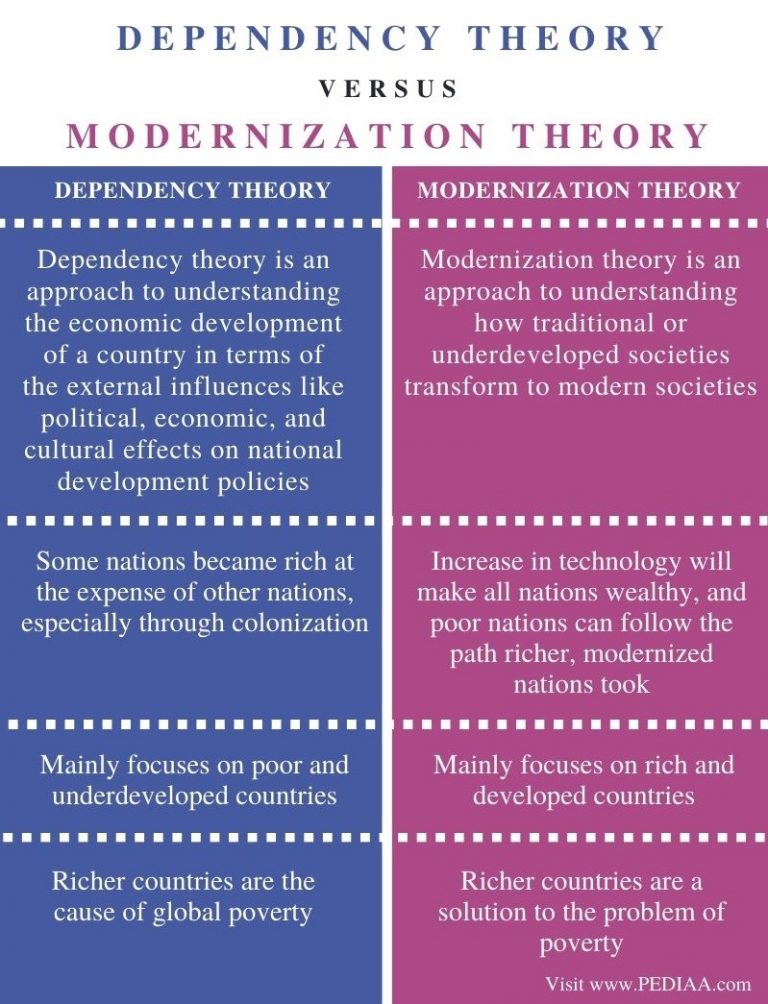Imagine stepping back in time, to a village untouched by the modern world. Life revolves around agriculture, families are large, and traditions are deeply ingrained in every aspect of daily life. Now imagine that village transforming—electricity arrives, schools open, and a bustling market emerges. This rapid shift, from tradition to modernity, is the essence of what modernization theory explores. But, is this progress always positive, or do the unintended consequences of development create new challenges?

Image: pediaa.com
Modernization theory delves into the intricate process of societal transformation, looking at how societies transition from a traditional stage characterized by agrarian economies, rigid social structures, and limited technology, to a modern stage defined by industrialization, urban development, and individual mobility. It’s a journey that impacts not just economies but also culture, politics, and even individual identities. It’s a theory that has sparked heated debate – some hail it as a roadmap to progress, while others criticize it for perpetuating Western-centric views and overlooking the complexities of global development.
A Glimpse Into the Past: The Roots of Modernization Theory
The seeds of modernization theory were sown in the 19th century, as the Industrial Revolution swept across Europe. Observing the rapid social and economic changes, thinkers like Auguste Comte and Karl Marx began to theorize about the inevitable trajectory of societies toward modernity. Their ideas laid the foundation for later scholars, who further developed modernization theory in the mid-20th century.
One of the key figures in this evolution was sociologist Talcott Parsons, who, in the 1950s, outlined a framework for understanding the stages of social development. He argued that societies progressed through a series of stages, marked by increasing differentiation (specialization of functions), functional integration (harmonious interplay of specialized parts), and value generalization (shared values that unite the society). Parsons’ work emphasized the importance of the “achievement orientation” – valuing individual merit and hard work – as a key driver of economic growth and social progress.
However, modernization theory goes beyond a linear model. Other prominent theorists, like Walt Rostow, explored the role of “takeoff” – the point at which a society achieves sufficient technological and economic development to sustain rapid growth. Rostow identified a five-stage model – from “traditional society” to “age of high mass consumption” – which provided a framework for analyzing the economic development trajectory of different nations.
The Dynamics of Change: Modernization’s Key Elements
But the journey to modernity isn’t simply about economic growth; it involves complex social and cultural transformations. Modernization theory highlights several key elements at play:
-
Urbanization: As economic opportunities shift from agriculture to industry, rural populations gravitate towards urban centers. This creates sprawling cities, changing social structures, and challenges in managing resource allocation and infrastructure.
-
Industrialization: The rise of factories and the adoption of new technologies fuel economic growth but also disrupt established ways of life. New patterns of work emerge, altering social roles and relationships.
-
Education and Literacy: Increased access to education, particularly for women, is often seen as a pivotal factor in modernization. Education paves the way for social mobility, innovation, and the development of a more skilled workforce.
-
Political Development: Modernizing societies tend to see the evolution of democratic institutions, with increased participation in the political process. This shift away from traditional power structures can be tumultuous, leading to social unrest and political instability.
-
Mass Media and Communication: The growth of mass media and communication technologies, from newspapers to the internet, accelerates the spread of information and ideas, influencing public opinion and shaping cultural norms.
Beyond the Western Lens: The Debate Over Modernization
While modernization theory has been influential in shaping development strategies, it’s not without its critics. Many scholars point out its inherent bias – often viewing the Western model as the ultimate goal, neglecting the diverse paths to progress in different cultures. This critique is particularly relevant in the context of developing nations, where modernization is often viewed as a recipe for homogenization and the erosion of unique cultural traditions.
Moreover, modernization theory has been criticized for neglecting the role of colonialism and global inequality in shaping development trajectories. The unequal distribution of power and resources, rooted in historical exploitation, makes it more challenging for some societies to navigate the path to modernity.

Image: study.com
Embracing Complexity: A Nuance View of Development
Modernization theory, despite its limitations, offers valuable insights into the intricate dynamics of societal change. But it’s essential to approach it with a critical lens, recognizing the complexities of development and the diversity of human experiences. Rather than viewing modernization as a linear journey towards a Western ideal, we can understand it as a process of adaptation and transformation that is shaped by specific historical, cultural, and geopolitical contexts.
Moving Forward: Insights for The Future
As we navigate the 21st century, modernization theory continues to offer relevant insights. Here are a few key takeaways:
-
Importance of Local Context: Development strategies must be tailored to specific social, cultural, and environmental contexts. There is no one-size-fits-all model for modernization.
-
Sustainable Development: Economic progress must be balanced with environmental protection and social equity. Modernization should aim to create societies that are both prosperous and resilient.
-
Inclusive Growth: The benefits of development should reach all members of society, fostering opportunities for social mobility, and addressing inequalities.
Modernization Theory Definition
https://youtube.com/watch?v=TyMLaBO8JLg
Embracing A Better Future
Modernization is a journey with no set destination. It’s a continuous process of transformation, punctuated by challenges and opportunities. By acknowledging its complexities, engaging in critical dialogue, and prioritizing inclusive and sustainable development practices, we can create a future that embraces progress, celebrates diversity, and leaves no one behind.
This is just the beginning of the conversation. Share your thoughts, perspectives, and questions in the comments below. Let’s continue exploring the fascinating world of modernization theory together!






